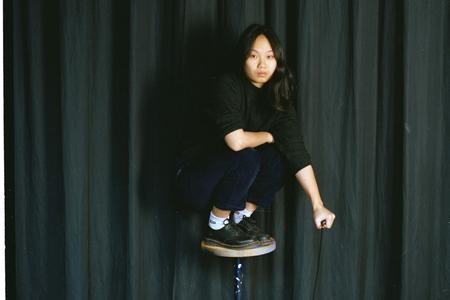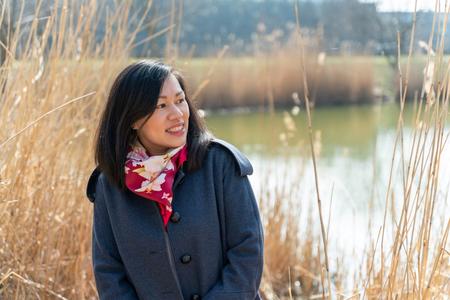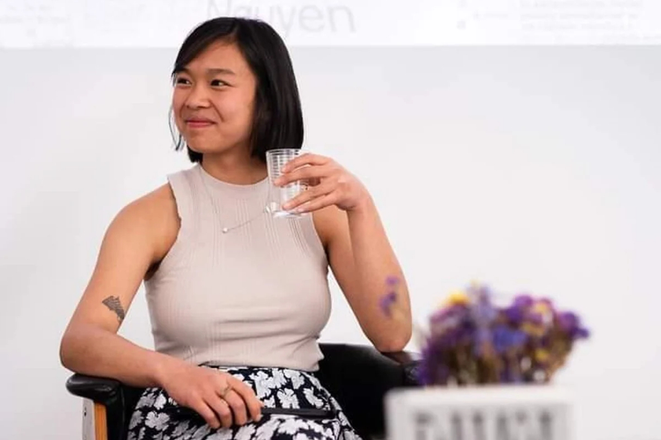Friends do not call HOANG ANH NGUYEN, 20, other than Anička. Her teachers at kindergarten came up with the name, Anh being similar. A few months ago she graduated from the bilingual high school Gymnázium Jura Hronca (GJH) and, in addition to her passion for history and humour, she devotes herself to writing literature.
Nguyen spent her first eight years growing up in the town of Malacky, western Slovakia, then moved to Bratislava with her parents. She belongs to the so-called banana children, meaning the second generation of the Vietnamese minority. "I am white on the inside, but I am yellow on the outside," she says.
Unlike older generations planning to retire in Vietnam, Hoang Anh Nguyen is not thinking about leaving. She has friends, a job, is part of the culture, and from her grasp of Slovak it is almost impossible to tell her ethnicity. The topics, issues and way of thinking are not that different from her peers.
In her art, she employs the cultural contrast that she carries within herself: memories of Vietnam, life in Slovakia, deviation from the expectations placed on her by her family and the Vietnamese minority.
She won the main prize at this year's Literárny Zvolen literature competition, earning mentoring with writer and translator Weronika Gogola. Hoang Anh Nguyen is currently working on her own book.

Would it be a problem if a white person called you 'banana'?
I would be pleasantly surprised that they used an inside term like that and that they also knew about things not much talked about in Slovakia.
With your friends, you cultivate a specific sense of humour, one that would probably sound rather harsh to the uninitiated. Is this your strategy to fight against racism or prejudice?
I grew up with humour. When I was younger and found myself in unpleasant situations, I always tried to turn them into something funny. I was able to process it better, and I noticed that people's reactions were also suddenly relaxed. They were surprised that we could also have a sense of humour and make fun of ourselves. However, humour is not applicable in every situation.
GJH is known for its open approach to diversity. Were there any problems?
Fortunately, no. Only one friend of mine, also a banana, was bullied because of his accent. He was from the Záhorie region and spoke a dialect. However, the taunts did not last long and stopped after a while.
You also grew up in Záhorie, but one cannot tell when talking to you.
I'm told that my accent is rather similar to the Central Slovakia dialect, which, paradoxically, rubbed off on me from my nanny, a Malacky-born woman. When my family and I were about to move to Bratislava, she taught me to speak SPISOVNÁ Slovak to avoid misunderstandings and I wouldn't be bullied. But when I say 'mäso' (meat) or Pezinok (a town near Bratislava), for example, I put a lot of emphasis on the vowels, making it sound like Pe-zinok. People don't often catch that, but I hear it every time I transfer the pronunciation from Vietnamese. However, I don't have a pronounced Vietnamese accent.

When the teacher is watching, all children are equal
You went to kindergarten and daycare in Malacky. What are your memories?
The kids did not play with me there. I didn't understand why, because I couldn't see the difference between them and me. Despite the fact that my skin and hair were slightly darker and yellower, I didn't notice any difference. I only realised it once in Bratislava, where I met many more Vietnamese girls. Here, there were at least two other Vietnamese children in a given grade of a primary school. Malacky was not as friendly as Bratislava.
Did the teachers not try to get you involved in the group?

 HOANG ANH NGUYEN. (source: Soňa Vozárová)
HOANG ANH NGUYEN. (source: Soňa Vozárová)